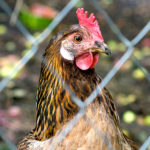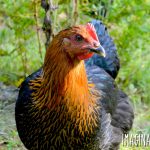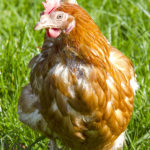Discover essential tips for caring for old hens and ensuring their health and happiness in their golden years. Learn what to expect and how to provide optimal care for your elderly chickens.

After years of keeping backyard chickens, I have cared for many elderly hens. On our homestead, chickens aren’t just livestock—they’re cherished pets that are cared for their entire life.
Long after their egg-laying days are over, these aging hens remain important members of our flock. In addition to their entrainment, they help maintain peace and pecking order and contribute to the ecosystem of our vegetable garden, serving as both compost generators and efficient pest controllers.
They are also the best cheerleaders to new egg-layers, showing them the nesting boxes, standing by as they lay their first eggs, and joining them in the egg song.
Providing care for elderly hens requires a little additional attention and adjustments tailored to their changing needs to ensure their well-being and happiness.
How Long Can a Chicken Live?
On average, chickens can live anywhere from 5 to 8 years. However, it’s not uncommon for some to exceed this lifespan, with some hearty breeds reaching 10 years or more. Factors that can influence the longevity of chickens include:
- Breed: Certain breeds are known for their long lives, while others may have a shorter lifespan due to genetic predispositions to health issues.
- Diet: A nutritious and balanced diet contributes to overall health and can extend the lifespan of chickens.
- Environment: A clean, safe, and stress-free environment can promote longevity.
- Health Care: Regular monitoring and prompt treatment of health issues can help chickens live longer, healthier lives.
What Changes as Chickens Age?
As hens mature, their needs and behaviors evolve. Understanding these changes can help ensure the continued health and well-being of aging hens.
Decreased Egg Production
One of the most noticeable changes is a decline in egg production. As they reach their later years, chickens lay fewer eggs, eggs with thin eggshells, or may stop laying altogether. This decrease in egg production is a natural part of the aging process and is influenced by hormonal changes and reduced reproductive capacity.
Slower Movement and Activity Levels
Aging chickens may have reduced mobility and activity levels compared to their younger counterparts. They may spend more time dust bathing, sitting in the sun, or moving at a slower pace. Providing easy access to food, water, and roosting areas can help accommodate their changing mobility needs.
Increased Vulnerability to Health Issues
Like all living creatures, older chickens are more susceptible to various health issues, including respiratory problems, arthritis, and reproductive disorders. Regular health checks, proper nutrition, and a clean living environment are essential for preventing and managing age-related health issues.
Changes in Feather Condition
As chickens age, their feathers may become duller, thinner, or more brittle. Molting, the natural process of shedding old feathers and regrowing new ones, may take longer in older hens. Providing a balanced diet rich in protein and essential nutrients can support healthy feather regrowth.
Shifts in Pecking Order Dynamics
They may experience changes in their social dynamics within the flock. They might exhibit less aggressive behavior when asserting dominance or become more solitary. Monitoring flock interactions and providing opportunities for older hens to rest undisturbed can help minimize stress and maintain harmony within the flock.
You can help your aging hens enjoy a comfortable and fulfilling life by recognizing and accommodating changes that occur in their senior years. Read on for tips to help your hens in their golden years.
How to Support Your Old Laying Hens in Their Golden Years
As our feathered friends grow older, it becomes clear that senior hens have distinct care requirements to lead healthy, happy lives in their retirement. Here are some things you can do to keep your hens healthy and happy in their retirement:
Offer Proper Nutrition
Unlike younger chickens, older hens have a slowed metabolism that can promote unhealthy weight gain if not properly managed. Go easy on the treats and stick to a nutrient-dense feed of around 14-16% protein to help curb excess fat buildup while supplying essential nutrition and amino acids for maintaining muscle mass. Consider switching to crumbles rather than pellets, as crumbles may be easier for older hens to digest.
If you have a flock of mixed ages, you can continue to provide regular layer feed. We feed our mixed flock a high-quality, 16% protein layer pellet food and provide a bowl of oyster shells for extra calcium for the hens that want it.
While calcium is no longer needed for egg production, the ability to absorb this mineral decreases over time, which can lead to bone conditions like osteoporosis. Offering a supplementary supply of calcium-rich feeds allows golden girls to self-regulate intake according to their needs. Crushed oyster shells or calcium carbonate make excellent natural calcium boosters for free-choice.
A healthy immune system can be supported by a good diet, which prevents illness. Additionally, providing a diverse diet that includes fresh fruit, leafy greens, sprouted grains, and vegetables can be incredibly beneficial for older hens. This can supply them with various vitamins, minerals, and antioxidants to help maintain their health.

Provide Plenty of Fresh Water
Ensure access to fresh, clean water at all times, as dehydration can worsen age-related health issues. Add additional waterers so the flock has easy access whenever they need it.
Perform Regular Health Checks
Observe your flock daily so you can spot unusual activities that may mean your elderly hen is struggling. Some common issues that older hens may need help with include:
- Nail Trimming: Over time, a chicken’s nails (claws) can become overgrown, which may lead to discomfort or difficulty walking. Regularly inspect and trim your hen’s nails as needed to prevent overgrowth. Use a pair of sharp, clean nail clippers and be cautious not to cut the quick, which contains blood vessels and nerves.
- Mites and Lice: Older hens are more susceptible to external parasites such as mites and lice. Check your hens regularly for signs of infestation, such as feather loss, redness, or irritation around the vent area. Treat infestations promptly with appropriate poultry-safe products, such as dusting powders or sprays, and consider treating the coop and nesting areas as well.
- Respiratory Issues: Elderly chickens may be more prone to respiratory problems like chronic respiratory disease or bronchitis. Watch for signs of respiratory distress, such as wheezing, coughing, sneezing, or nasal discharge, and separate the hen and consult with a veterinarian if you suspect a respiratory issue.
- Reproductive Problems: Older hens are more susceptible to a range of reproductive issues, including egg binding, ovarian tumors, egg peritonitis, and prolapsed oviduct. Watch for signs of digestive disturbances such as decreased appetite, lethargy, weight loss, or abnormal droppings, and seek veterinary care if you suspect any of these issues.
Chickens tend to hide their illnesses so they don’t appear weak. It is important to keep a close eye on your older hens for any signs of health problems and take care of them immediately to make sure they do not suffer in their final days. If you do not have access to a veterinarian who specializes in poultry, you can contact a local vet who may be able to humanely euthanize your hen if she is in distress.
Adapt the Housing
As chickens age, they may experience decreased mobility and activity levels. Modify the coop to provide a comfortable environment for older hens.
Cold and harsh winter drafts can aggravate arthritis, especially in winter. So, eliminate drafty areas near the perches in the coop and consider supplemental heat if needed.
Provide ample bedding to cushion their joints and keep the coop warm and dry. Add lower roosts and ramps for birds challenged to fly or jump. Consider elevating food and water dishes, so they are easily accessible.
Ensure outdoor runs and coops are predator-proof and eliminate hazards like sharp edges, which can injure fragile skin.

Maintain a Clean Environment
Always keep coops clean, dry, and well-ventilated to avoid disease triggers. Regularly remove soiled bedding, wash the feeders and watering containers frequently, and disinfect the coop as needed to create a hygienic living environment for older hens.
Maintain a dust bathing area filled with fresh, dry, sandy soil. Elderly chickens may have difficulty preening themselves effectively, making dust baths essential for removing excess oils and debris from their feathers.
Also, consider restricting visitors and their germs from visiting your older hens. Diseases can be transferred easily from clothing and shoes. Follow diligent biosecurity at all times.

Provide Mental Stimulation
It is beneficial to keep elderly chickens active and engaged to maintain their physical and mental fitness. You can provide them with activities such as pecking toys, perches of different heights, and access to outdoor foraging areas to keep them mentally stimulated and prevent behavioral issues.
Additionally, encourage them to spend time foraging in the yard for bugs, if it can be done safely. This will promote physical exercise and avoid boredom.

Improve Predator Protection
Protecting aging backyard chickens from predators is crucial, as older birds may lack the agility to escape.
Regularly inspect the coop and run for vulnerabilities like gaps or weak wire mesh. Reinforce and heighten fencing if needed. Eliminate hiding spots inside the coop and secure all entry points with solid latches and covers. Increase nighttime protections with motion-sensor lighting or electric perimeter fencing.
Avoid placing coops near areas that provide predator cover, such as thickets or wooded edges. Keep surrounding vegetation trimmed to prevent unseen approaches. Create a buffer zone around the coop for better visibility.
Be extra diligent when free-ranging. Keep a close eye on elderly hens that may wander away from the rest of the flock, as they may be more vulnerable to predators when alone. Consider supervising free-ranging sessions or using temporary fencing to keep older hens within sight of the flock.

Watch for Bullying
Older hens may become targets of bullying or aggression from younger flock members. Keep a close eye on flock dynamics and intervene if necessary to protect older hens from harassment. In age-mixed flocks, younger hens may chase or pluck elderly feathers.
Creating a low-stress living environment can prevent illness and disease in your elderly hens. Multiple feeding and watering stations can reduce competition and minimize bullying behavior. Observe any loners struggling to integrate.
We had a few situations where it was necessary to separate an elderly hen so she wasn’t picked on. We moved the hen and two of her best friends to another coop so she could live her last days in peace.

What to Expect When a Hen Dies of Old Age
Losing a beloved hen to old age is a natural part of caring for chickens. Here are some things to expect when a hen passes away from old age:
- Physical Signs of Decline: Look for physical signs of decline, such as weight loss, weakness, difficulty breathing, or changes in posture or behavior. These signs can indicate that a hen is nearing the end of her life.
- Decreased Activity: As hens age, they will become less active and spend more time resting. A sudden decline in activity or lethargy may indicate that a hen is nearing the end of her life.
- Isolation: Older hens may isolate themselves from the rest of the flock as they become weaker or more vulnerable. They may seek out quiet, secluded areas to spend their final moments.
- Loss of Appetite: Aging hens will lose interest in eating or drinking as their energy levels decline. This loss of appetite is common in the final stages of life.
- Natural Death: In many cases, hens will pass away peacefully in their sleep or while resting. They will show signs of weakness, heavy breathing, and become less responsive before passing away.
When a hen shows signs of nearing the end of her life, it is important to make sure she is comfortable and safe so she can pass away in peace. Once a hen has passed away, handle her remains respectfully and dispose of them properly. We have a little chicken graveyard under an apple tree at the edge of our property.
Losing a hen you raised from a chick can be very emotional, especially if the hen was a cherished pet. Allow yourself time to grieve and remember the positive memories you shared with your bird.
—
I hope these tips help you care for your elderly hens. As our beloved feathered friends age, they may experience a variety of health challenges and need special care to ensure their comfort and well-being.
It is important to monitor their health closely, provide a comfortable and safe living environment, and offer a nutritionally balanced diet. By taking these steps, we can help our elderly hens age gracefully and continue to enjoy a happy, healthy life as cherished members of our homestead.




Leave a Reply